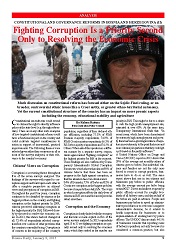
DPC BOSNIA DAILY: Constitutional And Governance Reforms In Bosnia and Herzegovina (II)
Bosnia Daily: January 9, 2015 – Constitutional And Governance Reforms In Bosnia and Herzegovina (II)
More...We kindly inform you that, as long as the subject affiliation of our 300.000+ articles is in progress, you might get unsufficient or no results on your third level or second level search. In this case, please broaden your search criteria.

Bosnia Daily: January 9, 2015 – Constitutional And Governance Reforms In Bosnia and Herzegovina (II)
More...
(English edition) This report contains the analysis of data collected during the month of October 1999. One should have in mind this time frame-when considering the findings, drawing different generalizations or setting guidelines for possible actions. Sets of values of members of the observed generation, their social awareness, perception of the past and present, their stance on the West, and above all their potential to bring about changes are essentially determined by some long-standing and less intensive structural factors. To put it simply a generation of people who today have between 25 and 35 years, and who represent the future of the country, was to a large extent formed under the influence of structural features of the society eroded by constant wars and war threats, protracted economic crisis, internal conflicts and strife and total confusion in the sphere of social awareness and public moral. The generation which in the last decade came of age in such a society per force had to reflect its essential characteristics, despite a relative autonomy which each age groups had as its inherent characteristic. Young people and even relatively young people, to which the respondents of this survey belong, have a determined biological and psychological potential which can help them partially overcome the given moment of time and which usually indicates some of their future contents and values in the present day. In that sense one could expect that the mind-set of the observed generation substantially differs from so-called social conscience. But in conditions of an ever-deepening social crisis, in which the process of coming-of-age unfolded under pressure of retrograde, rather than progressive social factors, the aforementioned advantages of such a generation are less manifest, since their potential crumbles under pressure of a regressive society. One must bear in mind the aforementioned and thus avoid to treat unjustly the observed age group: they are expected to be the creators of the Serbian society at the beginning of the Twenty-first century, but it is pretty obvious that their social actions will be affected by a sorry legacy of the social and moral collapse. In fact they were not less predestined than the earlier generations to be unequipped for the contemporary world. They simply developed under much less favorable conditions. But this should not minimize their responsibility for the future development of society in Serbia. On the other hand such adverse development factors should be borne in mind if one truly wishes to understand the traits of this generation, instead of bluntly condemning them. My intention is not to prejudge results evidenced by this survey, but it bears mentioning that it is easier to reject the middle generation in Serbia, like Serbia proper, than to try to understand and render assistance to both.
More...
This report contains the analysis of data collected during the month of October 1999. One should have in mind this time frame-when considering the findings, drawing different generalizations or setting guidelines for possible actions. Sets of values of members of the observed generation, their social awareness, perception of the past and present, their stance on the West, and above all their potential to bring about changes are essentially determined by some long-standing and less intensive structural factors. To put it simply a generation of people who today have between 25 and 35 years, and who represent the future of the country, was to a large extent formed under the influence of structural features of the society eroded by constant wars and war threats, protracted economic crisis, internal conflicts and strife and total confusion in the sphere of social awareness and public moral. The generation which in the last decade came of age in such a society per force had to reflect its essential characteristics, despite a relative autonomy which each age groups had as its inherent characteristic. Young people and even relatively young people, to which the respondents of this survey belong, have a determined biological and psychological potential which can help them partially overcome the given moment of time and which usually indicates some of their future contents and values in the present day. In that sense one could expect that the mind-set of the observed generation substantially differs from so-called social conscience. But in conditions of an ever-deepening social crisis, in which the process of coming-of-age unfolded under pressure of retrograde, rather than progressive social factors, the aforementioned advantages of such a generation are less manifest, since their potential crumbles under pressure of a regressive society. One must bear in mind the aforementioned and thus avoid to treat unjustly the observed age group: they are expected to be the creators of the Serbian society at the beginning of the Twenty-first century, but it is pretty obvious that their social actions will be affected by a sorry legacy of the social and moral collapse. In fact they were not less predestined than the earlier generations to be unequipped for the contemporary world. They simply developed under much less favorable conditions. But this should not minimize their responsibility for the future development of society in Serbia. On the other hand such adverse development factors should be borne in mind if one truly wishes to understand the traits of this generation, instead of bluntly condemning them. My intention is not to prejudge results evidenced by this survey, but it bears mentioning that it is easier to reject the middle generation in Serbia, like Serbia proper, than to try to understand and render assistance to both.
More...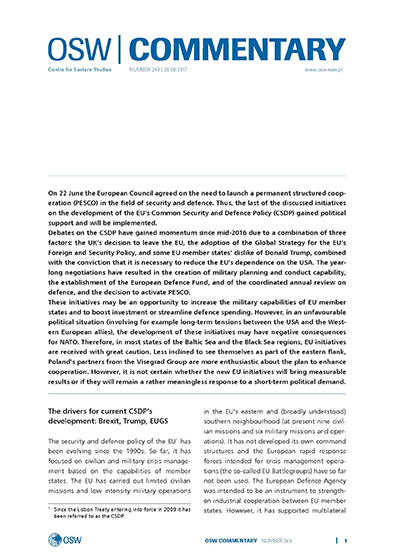
The peace deal agreed on 5 September 2014 concerning the ceasefire in the region covered by the conflict in the Donbas brought about a significant reduction in the scale of military clashes. However, in mid-January the separatist forces, supported by the Russian military, started an offensive along the entire front line. For example, they seized the airport in Donetsk and the village of Krasnyi Partyzan. About a third of the Donetsk and the Lugansk oblasts currently remain outside Kyiv’s control (see Map). Before the war, these areas were inhabited by 6.6 million residents, 15% of Ukraine’s total population. The process launched in September 2014 in Minsk, which was intended to regulate the conflict within the so-called trilateral contact group (Ukraine, Russia, the OSCE and representatives of the separatists), resulted in an exchange of some prisoners of war, although it failed to have any political effects. Attempts at regulating the political situation were additionally complicated by the illegal ‘elections’ of leaders of the two separatist regions, the so-called Donetsk and Lugansk People’s Republics (the DPR and LPR).
More...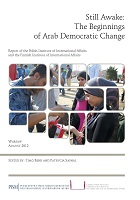
We are pleased to announce the release of the joint PISM - FIIA report: Still Awake: The Beginnings of Arab Democratic Change, edited by Timo Behr (FIIA) and Patrycja Sasnal (PISM). With the deluge of focused policy analyses and daily news from the Middle East, the report attempts to look at the changes in the Arab world in a long-term and clearly structured perspective along with unorthodox conclusions. It examines five cases of political transition in the Arab world—Egypt, Libya, Morocco, Syria and Yemen—and summarizes the events so far and provides country-by-country timelines. Another distinct aspect of the report is that it has been produced by two major think tanks from European countries that do not have vital interests in the Middle East: Poland and Finland. Apart from the chapters authored by the editors it also features contributions from Hanna Ebeid (ACPSS, Egypt), Sylvia Colombo (IAI, Italy) and two Polish diplomats, Stanisław Guliński and Jakub Sławek.
More...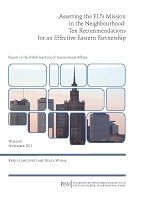
The authors consider that the EU needs to assert its role and mission in the Eastern neighbourhood with more vigour. To do this the Eastern Partnership needs to focus on the job of building up the rule of law and democracy in Eastern Europe. Though much has been achieved over the past two years, in terms of creating up the institutional framework for EaP, the reality is that democracy is back sliding in the region, corruption is endemic and social and economic catch-up of EaP countries towards EU levels is uncertain. Without fuller democratisation and promotion of the rule of law in the neighbourhood the implementation of EaP will be stunted.The Eastern Partnership holds the potential to do more but only if the EU develops a ‘democratic acquis’ replete with a precise reform agenda. Building up administrations and rooting out the sources and practices that perpetuate corruption should be a priority, twinned with a better capacity to support civil society and non-registered opposition groups and political parties, as envisaged in the European Endowment for Democracy. Negotiations on trade need to be accompanied by meaningful benefits and concessions that partner states can enjoy in the short and medium term if economies are to grow. Finally, to meet the expectations of those countries that value their European identities and where public support for the EU exists the effectiveness of EaP can be bolstered by stressing Article 49 of the Treaty on European Union. Emphasising a ‘European Perspective’ will remind partner states and EU members of the right that all European countries have to join the EU if they share EU values and fulfil economic and political membership criteria.
More...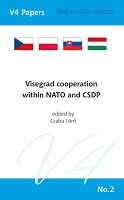
The Polish Institute of International Affairs has published the second issue of the “V4 Papers” titled “Visegrad Cooperation within NATO and CSDP”. The volume edited by Dr Csaba Törő of the Hungarian Institute of International Affairs analyzes past experiences and prospects for V4 cooperation within NATO and the EU’s Common Security and Defence Policy. It also encompasses Baltic and Ukrainian perspectives on security and defense issues. The publication is a part of a project "Creating a Sphere of Security in Wider Central Europe: Sharing V4 Know-how in Cooperation on Security with the Neighbouring Regions" supported by the International Visegrad Fund.
More...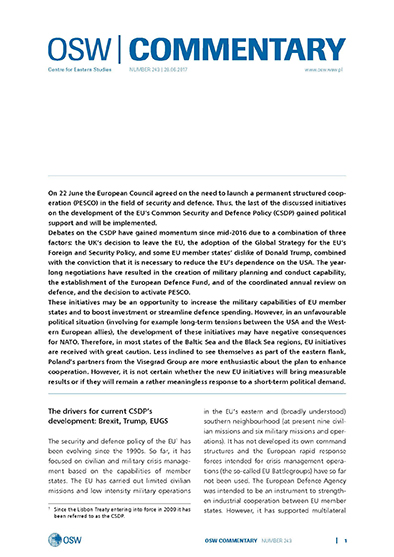
Over the past three years, a distinct change has become visible in the ideological discourse of the government of Belarus. To an increasing degree, the state ideology is focusing on strengthening national identity, emphasising the divergence of Belarus’s interests from those of Russia, and re-examining the historical narration in a direction which emphasises the distinctiveness of the history of Belarus from that of Russia. Above all, the government has changed its attitude towards the Belarusian language and culture. A campaign promoting the Belarusian language is being carried out on a large scale – under the auspices of state ideologues. The government has also become involved in the promotion of vyshyvanki, traditional, embroidered Belarusian clothes and their ornamentation. This allows us to talk about a process of ‘soft Belarusianisation’. Articles criticising Kremlin policy have begun to appear fairly regularly in the government media. Official representatives of the authorities, while not going so far as to promote the idea of friendship with the West, no longer refer to it using the rhetoric of the ‘enemy’, as was previously the case. This modification of ideological discourse probably means that the regime is looking for new ways to arrange its relationships, both with its own society and with the countries of the West. This does not mean, however, that the authorities are ready for systemic changes. The role of the President and the concept of the state remain unaltered in ideological discourse; there is still no tripartite division of power, and civil society’s room for manoeuvre remains narrow.
More...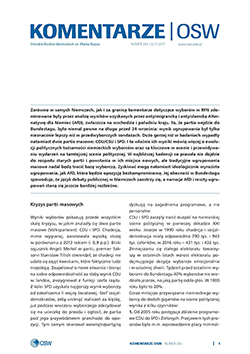
Over the past three years, a distinct change has become visible in the ideological discourse of the government of Belarus. To an increasing degree, the state ideology is focusing on strengthening national identity, emphasising the divergence of Belarus’s interests from those of Russia, and re-examining the historical narration in a direction which emphasises the distinctiveness of the history of Belarus from that of Russia. Above all, the government has changed its attitude towards the Belarusian language and culture. A campaign promoting the Belarusian language is being carried out on a large scale – under the auspices of state ideologues. The government has also become involved in the promotion of vyshyvanka, traditional, embroidered Belarusian clothes and their ornamentation. This allows us to talk about a process of ‘soft Belarusianisation’. Articles criticising Kremlin policy have begun to appear fairly regularly in the government media. Official representatives of the authorities, while not going so far as to promote the idea of friendship with the West, no longer refer to it using the rhetoric of the ‘enemy’, as was previously the case.This modification of ideological discourse probably means that the regime is looking for new ways to arrange its relationships, both with its own society and with the countries of the West. This does not mean, however, that the authorities are ready for systemic changes. The role of the President and the concept of the state remain unaltered in ideological discourse; there is still no tripartite division of power, and civil society’s room for manoeuvre remains narrow.
More...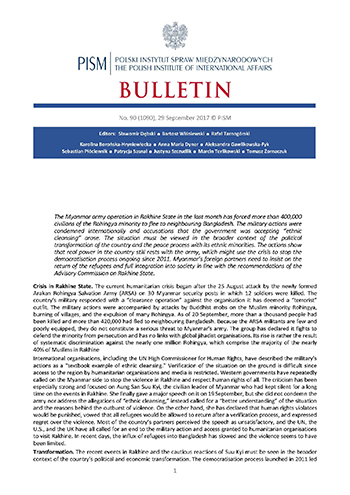
President Miloš Zeman’s dismissal of the Czech Republic’s deputy prime minister and finance minister, Andrei Babiš, and the appointment of Ivan Pilný to the office ends a political crisis that has lasted since the beginning of May. However, it has revealed an intense dispute between, on one side, Zeman and Babiš, chairman of the party Action of Dissatisfied Citizens (ANO), and Prime Minister Bohuslav Sobotka, the head of the Czech Social Democratic Party (ČSSD), on the other. The circumstances of Babiš’s dismissal have politically strengthened Sobotka five months before parliamentary elections.
More...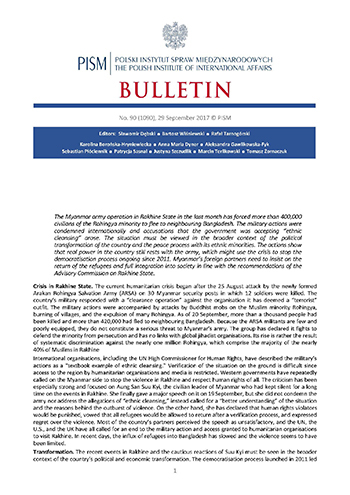
Ukrainian President Petro Poroshenko’s ad-hoc decision to authorise the trade blockade of Russia-occupied parts of the Donetsk and Luhansk regions was taken to diminish the risk of political instability in the country. However, the blockade will not solve the problem of the lack of a coherent state policy towards that area and poses a challenge to Ukraine’s energy security. Poland, for its part, has instruments it can use to support the modernisation of Ukraine’s energy system.
More...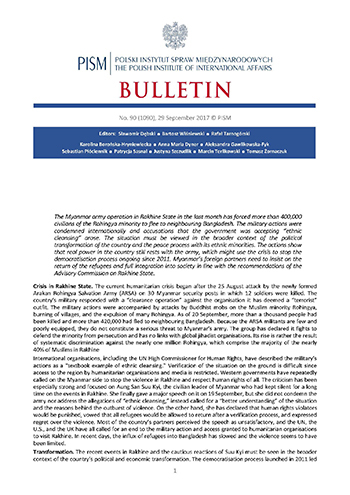
Recent protests in Belarus pose a challenge for the authorities, because along with slogans calling for improved social conditions, which appeared for the first time since the 1990s, the demonstrators have increasingly formulated political demands. So far, the Belarusian authorities have reacted in a limited manner by imposing administrative sanctions almost only on the opposition activists. In the near future, the intensity of the demonstrations will probably continue and may turn massive. Violations of human rights by Belarusian authorities is possible. Moreover, new events may prompt Russia to engage in the country directly.
More...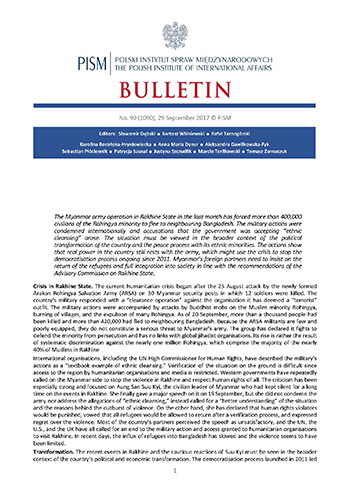
The South Korean president’s visit to China (13–16 December) sprung from a mutual willingness to improve bilateral relations. China opposes the deployment of the U.S. THAAD missile-defence system, an issue that remains a sticking point in Sino-South Korea ties. Their respective North Korea policy also has contributed to the deteriorating bilateral relations. The inability to resolve that issue may lead to diplomatic engagement of countries outside the region, including Poland, to try to ease tensions on the Korean Peninsula.
More...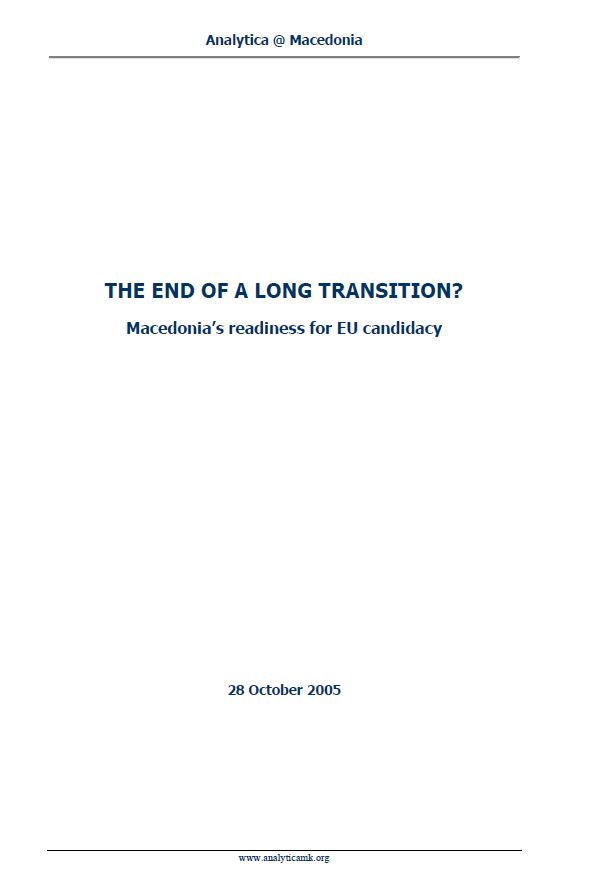
Mixed record of the EU following the failure of ratification of its first ever drafted constitution, on the one hand, and recent commitment shown to the enlargement, particularly in the cases of Turkey and Croatia, on the eve of 2006, the EU is faced with the big question whether to continue to demonstrate the commitment for the EU enlargement this time to the heart of the western Balkans region, towards Macedonia, success of which enlargement conditions the credibility of the EU’s foreign policy. Wider European and Balkan debate circles on EU enlargement currently have their ears in Brussels awaiting the avis of the Commission, which is to deliver whether Macedonia fulfils the conditions for candidacy and for negotiations for full Membership. The overall process of the European integration of Macedonia successfully started with the filling in the EC Questionnaire. However, as the date for the avis and for decision approaches, the calculations made for the rationale and benefits of enlargement to Macedonia, another western Balkan potential candidate after Croatia poses difficulty to EU officials and its member country representatives.
More...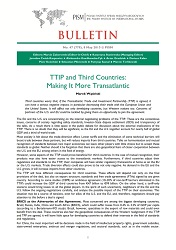
Third countries worry that, if the Transatlantic Trade and Investment Partnership (TTIP) is agreed, it can have a serious negative impact, in particular decreasing their trade with the European Union and the United States. It will affect not only developing countries, but Western nations too. Concerns of partners of the U.S. and EU could be tackled by giving them an opportunity to join the agreement.
More...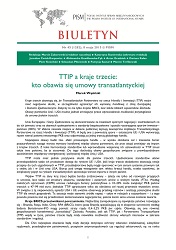
Kraje trzecie obawiają się, że Transatlantyckie Partnerstwo na rzecz Handlu i Inwestycji (TTIP) może mieć negatywne skutki, w szczególności ograniczyć ich wymianę handlową z Unią Europejską i Stanami Zjednoczonymi. Dotyczy to nie tylko krajów BRICS, lecz także bliskich sojuszników Zachodu. Obawy partnerów Unii i USA można jednak zmniejszyć przez wprowadzenie możliwości przystąpienia do umowy państw trzecich.
More...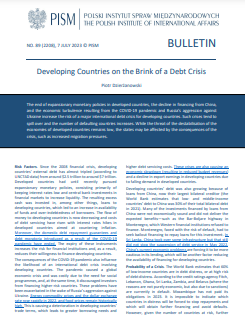
The end of expansionary monetary policies in developed countries, the decline in financing from China, and the economic turbulence resulting from the COVID-19 pandemic and Russia’s aggression against Ukraine increase the risk of a major international debt crisis for developing countries. Such crises tend to spill over and the number of defaulting countries increases. While the threat of the destabilisation of the economies of developed countries remains low, the states may be affected by the consequences of the crisis, such as increased migration pressures.
More...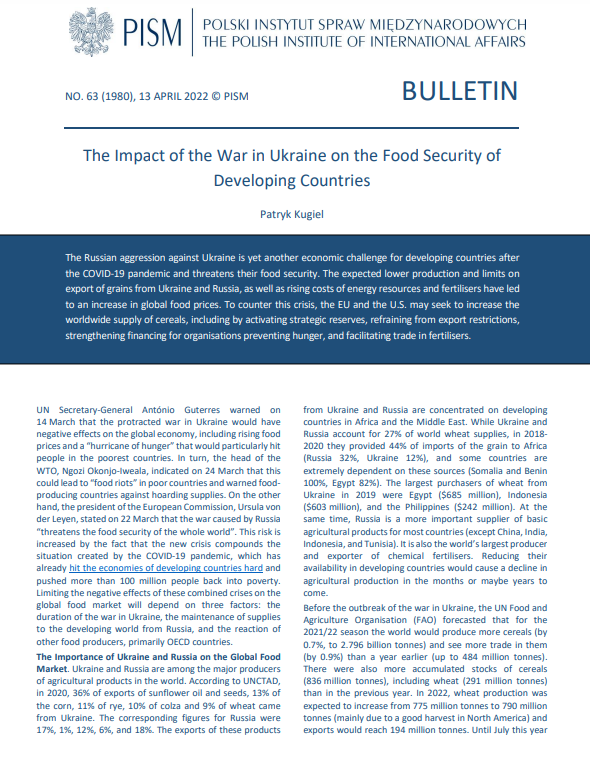
The Russian aggression against Ukraine is yet another economic challenge for developing countries after the COVID-19 pandemic and threatens their food security. The expected lower production and limits on export of grains from Ukraine and Russia, as well asrising costs of energy resources and fertilisers have led to an increase in global food prices. To counter this crisis, the EU and the U.S. may seek to increase the worldwide supply of cereals, including by activating strategic reserves, refraining from export restrictions, strengthening financing for organisations preventing hunger, and facilitating trade in fertilisers.
More...